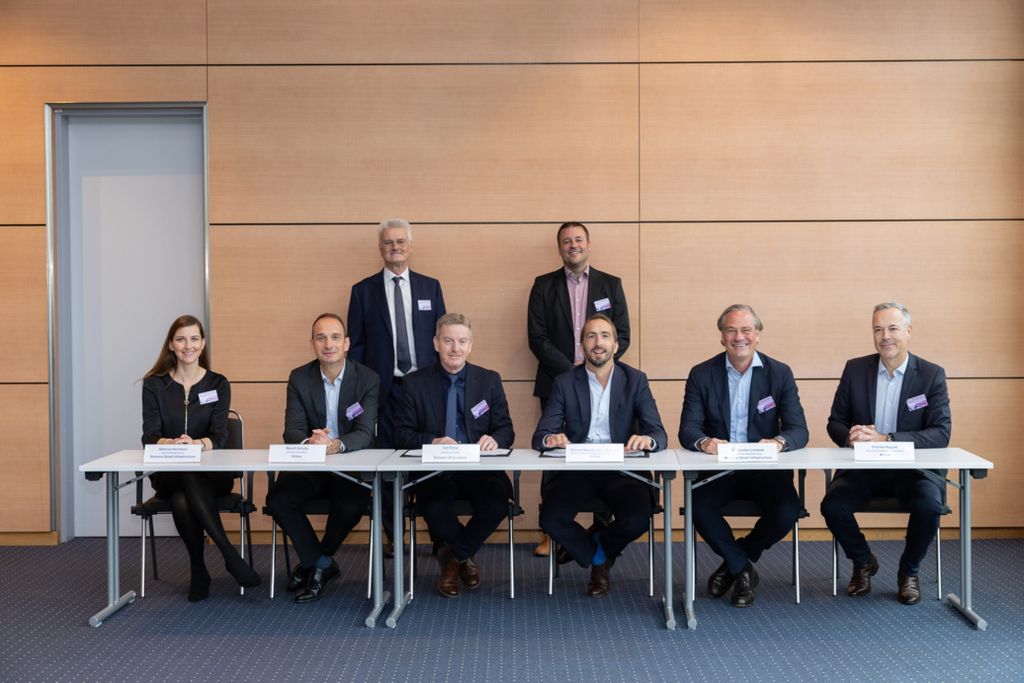The Steam page for Fearwoods has just been launched. It’s an online co-op survival horror where light and silence are the player’s only weapons. The title is being developed by a three-person independent studio, Fearwoods, created by…
Switzerland
Left to right: Sabrina Herrmann – Head of Buildings Germany,
Siemens Smart Infrastructure; Benoit Shultz – Chief Procurement Officer,
Airbus; Herbert Klipp – Corporate Account Manager, Siemens; Carl Ennis – CEO
Siemens UK & Ireland; Jan Schwarz – Vice President Real Estate &
Facility Management Procurement, Airbus; Florent Massou dit Labaquère, EVP
Operations Commercial Aircraft, Airbus; Carsten Liesener – Global Head Sales
& Operations, Siemens Smart Infrastructure; Charles Huguet – Senior Vice
President General Procurement, Airbus
framework agreement, Siemens will deploy its scalable and proven
decarbonization solutions, tailored to the selected sites, to support Airbus in
reaching the target of 80 kt CO2e abated annually from 2030.
The project will be led by Siemens’ Buildings
business and supported by Capgemini, combining the companies’ vast expertise in
sustainability and digitalization to ensure the success and timely delivery of
the project.
Decarbonization at
scale: Scalable solutions for measurable impact
Siemens will evaluate the sites and create
and implement an overall decarbonization masterplan for the awarded sites,
resulting in scalable solutions to reduce energy demand and carbon emissions.
To accelerate the selection of the measures, Energy System Twins will simulate
and help determine the best decarbonization roadmaps for the sites. The key
elements that will enable this include decarbonization of heat production via
heat pumps, energy efficiency upgrades, smart metering systems, on-site smart integration
of renewable energy, and smart energy management systems to monitor, control,
and optimize usage across the sites. These measures are designed to help Airbus
achieve its targets of reducing energy consumption by 20 percent and Scope 1
and 2 greenhouse gas emissions by 85 percent through 2030, compared to 2015
levels.
Capgemini has been appointed by Siemens for
the program to complete first phase consulting activities, governance
definition, and support for project management and planning. Capgemini also brings
its expertise in the digitalization and automation of the
energy monitoring and measurement systems.
“Our collaboration with Airbus is built on
years of mutual trust and shared ambition. It highlights Siemens’ capability to
deliver smart and scalable technologies and services to reduce the carbon
footprint of Airbus. At Siemens, we’re committed to making the energy
transition not only sustainable, but also achievable and scalable, so that
Airbus and other industrial leaders can confront climate challenges while
boosting operational resilience and long-term competitiveness,” said Susanne
Seitz, CEO of Buildings at Siemens Smart Infrastructure.
“We’re proud to be taking this important step
toward making our operations more energy-efficient and future-ready.
Collaborating with trusted partners is key in building a more resilient
industrial footprint. The site-specific expertise from our Airbus colleagues in
the U.K. and the U.S. combined with Siemens’ technical know-how will keep us on
the path toward meeting our energy use and emission reduction targets,” said
Florent Massou dit Labaquere, EVP Operations of Airbus Commercial Aircraft.
Roadmap to 2030
The initial phase began in summer 2025 with the
development of decarbonization roadmaps for each site. Engineering studies will
guide the implementation, with infrastructure rollout starting in 2026. Siemens
can also operate and maintain the new infrastructure, ensuring long-term
efficiency and resilience.
Siemens and Airbus have been working together
for more than half a century. Key initiatives have included factory automation,
industrial software, safety and security, building automation technology, and
beyond. This new agreement builds on successful collaboration to support
Airbus’ sustainability ambitions and achieve its targets for minimizing its
operational environmental footprint.
Siemens Smart Infrastructure (SI) is shaping the market for intelligent, adaptive infrastructure for today and the future. It addresses the pressing challenges of urbanization and climate change by connecting energy systems, buildings, and industries. SI provides customers with a comprehensive end-to-end portfolio from a single source – with products, systems, solutions, and services from the point of power generation all the way to consumption. With an increasingly digitalized ecosystem, it helps customers thrive and communities progress while contributing toward protecting the planet. To protect this journey, we foster holistic cybersecurity to ensure secure and reliable operations. Siemens Smart Infrastructure has its global headquarters in Zug, Switzerland. As of September 30, 2024, the business had around 78,500 employees worldwide.
Read more
In fiscal 2024, which ended on September 30, 2024, the Siemens Group generated revenue of €75.9 billion and net income of €9.0 billion. As of September 30, 2024, the company employed around 312,000 people worldwide on the basis of continuing operations. Further information is available on the Internet at www.siemens.com.
Read more





